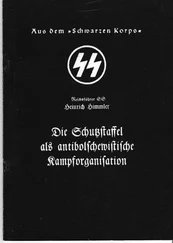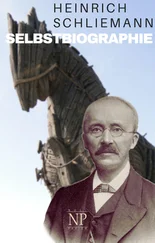After April 1943, when he was appointed Hitler’s personal secretary, Bormann increasingly governed Hitler’s daily life; he became an indispensable companion, sharing his worries, soothing his nerves, using his ‘cast-iron memory’ to clarify the growing complexity of Hitler’s war situation and guide his decisions. As Himmler said to Schellenberg:
‘The Führer has become so accustomed to Bormann that it’s very difficult indeed to lessen his influence. Again and again I have had to come to terms with him, though it’s really my duty to get him out. I hope I can succeed in out-manoeuvring him without having to get rid of him. He’s been responsible for many of the Führer’s misguided decisions; in fact, he’s not only confirmed his uncompromising attitude, he’s stiffened it.’ 23
Schellenberg positively enjoyed embarrassing his master, and continued throughout 1943 to remind him of his promise to remove Ribbentrop:
‘Because of the reflection of Himmler’s glasses, I could scarcely ever see his eyes… I had therefore made a habit of always staring at his forehead, just above the bridge of his nose, and this seemed to make him strangely uneasy after a few minutes. He would start to make notes or look into the drawer of his desk in order to escape my glance. On this occasion… he said, “I can only remove Ribbentrop with Bormann’s help, and the result would be an even more radical policy.”’
Goebbels, who had personal discussions with Goring in March 1943 in the hope that some sort of group representation of the old leaders could be formed to counteract the bad influence of Bormann, Ribbentrop, Lammers and Keitel, regarded Himmler as at least a potential ally; the theory was that Goring, roused from his lassitude, should reconvene the pre-war Council of Ministers, of which he was President, and through this set up an opposing factor with Goebbels, Himmler, Speer and Ley. In May Goebbels preens himself in his diary about the praise Himmler had given to his department and agrees with his stringent criticisms of Frick, the Minister of the Interior, whose lack of leadership he deplored. On the other hand, Semmler, Goebbels’s aide who kept his own diary at this time, recorded in March that Goebbels was equally suspicious of Himmler and Bormann — ‘not one of those three trusts the others out of his sight’.
Not that Bormann was unfriendly to Himmler’s face; he merely placed himself firmly between the Führer and Himmler, whose field headquarters in Birkenwald, East Prussia, were some thirty miles distant from the Wolf’s Lair. To Bormann (whose father had once been a bandsman who, according to Ribbentrop, had often performed on the bandstands on English sea-fronts in the years before 1914), Himmler was always ‘Uncle Heinrich’. As Party Chancellor, controlling the whole national Party machine, Bormann could do much in a quiet way to frustrate the influence of men as uniquely powerful as Goebbels and Himmler were to become between 1943 and the end of the war.
Himmler meanwhile built up a vast bureaucracy of his own; in addition to the Waffen S.S. in the field, some 40,000 men were employed by the S.S. leadership office, while the Reich Main Security Office had a strength of over 60,000. When S.S. General Heinz Guderian, the expert on armoured warfare who had been reinstated by Hitler after temporary dismissal and made Chief Inspector for Panzer Troops, met Himmler on 11 April at Berchtesgaden, he found him completely opposed to any integration of the new S.S. armoured divisions with the Army. Neither Hitler nor Himmler wanted to see the S.S., the personal army of the leadership, merged with the armed forces of the Reich. Nor could he persuade Himmler to influence Hitler in the direction of delegating more power to the Army; he ‘received an impression of such impenetrable obliquity’ that he gave up any thought of ‘discussing a limitation of Hitler’s power with him’.
Parallel with his extension of the Waffen S.S., Himmler turned his eyes in another direction that might assist his future powers. In April 1943 he visited the rocket establishment at Peenemünde for the first time, and met the scientist and soldier in charge of the research and development of liquid-propellant rockets, Major-General Walter Dornberger. The first experimental rocket of the pattern later known as the V2 had been successfully launched as early as October 1942, and Himmler was anxious to know more of this carefully-guarded secret weapon, for the development of which Hitler had not yet given full priority. 24Dornberger describes Himmler’s manner and appearance:
‘He looked to me like an intelligent elementary school teacher, certainly not a man of violence… Under a brow of average height two grey-blue eyes looked at me, behind glittering pince-nez, with an air of peaceful interrogation. The trimmed moustache below the straight, well-shaped nose traced a dark line on his unhealthy pale features. The lips were colourless and very thin. Only the inconspicuous receding chin surprised me. The skin of his neck was flaccid and wrinkled. With a broadening of his constant set smile, faintly mocking and sometimes contemptuous about the corners of the mouth, two rows of excellent white teeth appeared between the thin lips. His slender, pale and almost girlishly soft hands, covered with veins, lay motionless on the table throughout our conversation.’
Dornberger soon discovered the nature of Himmler’s interest.
‘I am here to protect you against sabotage and treason’, he said. Peenemünde was too much in the limelight; its security had become of national importance, and not merely the concern of the Army, under which its activities were formally placed. As he left, Himmler promised Dornberger that he would come back for further private discussions.
‘I am extremely interested in your work’, he said. ‘I may be able to help you.’
The infiltration of the S.S. into the work at Peenemünde followed immediately on this meeting. Dornberger’s Station Commander, Colonel Zanssen, an experienced man who had been at Peenemünde for some years, was suddenly dismissed without any reference to the Army departments concerned. This was done by order of Himmler on the most trivial charges, which the S.S. refused to authenticate. Dornberger managed to have Zanssen reinstated with the support of General Fromm, the Commander-in-Chief of the Reserve Army under whose command Peenemünde was placed. After the war, Dornberger learned that Professor von Braun, who was then one of the senior research officers at the establishment, had under an oath of secrecy been offered by Himmler full scope to develop Peenemünde if the S.S. ever took over. Von Braun had rejected the offer.
Himmler’s second visit came on 29 June; he arrived driving his own small armoured car. As usual, he made a better impression in private than he did in public. Dornberger describes him at a meeting with the senior research workers:
‘Himmler possessed the rare gift of attentive listening. Sitting back with legs crossed, he wore throughout the same amiable and interested expression. His questions showed that he unerringly grasped what the technicians told him out of the wealth of their knowledge. The talk turned to the war and the important questions in all our minds. He answered without hesitation, calmly and candidly. It was only at rare moments that, sitting with his elbows resting on the arms of the chair, he emphasized his words by tapping the tips of his fingers together. He was a man of quiet, unemotional gestures. A man without nerves.’
He seemed happy to talk politics in this group of men whose interests were absorbed in science and engineering. He spoke of Europe as a social and economic unit controlled by a racially-sound Germany which had come to an understanding with Britain, whose main interests lay overseas and with America. The Slav block was the great danger to Europe, and that was why Hitler had gone to war with Russia before the Slav nations had been welded into one invincible group under Russian domination. He compared the Western European worker, with his demand for leisure and a high standard of living, with the Russian worker, dedicated entirely to his factory’s output and ready in time to flood world markets with cheap goods. The war was therefore just as much an economic struggle as it was military and political. They argued about the German occupation of Poland — ‘Himmler’s glasses glittered. Was I mistaken,’ wrote Dornberger, ‘or had his imperturbable, impenetrable mask of amiability fallen a little?’ Poland was needed for German colonization, he said. The birth-rate of the Poles would have to be reduced until the German settlers grew sufficient in numbers to take over the territory. ‘We shall arrange for the young German peasants to marry Ukrainian girls of good farming stock and found a healthy new generation adapted to conditions out there… We must practice a rigid state-planned economy both with men and material throughout conquered territory’, he added.
Читать дальше











